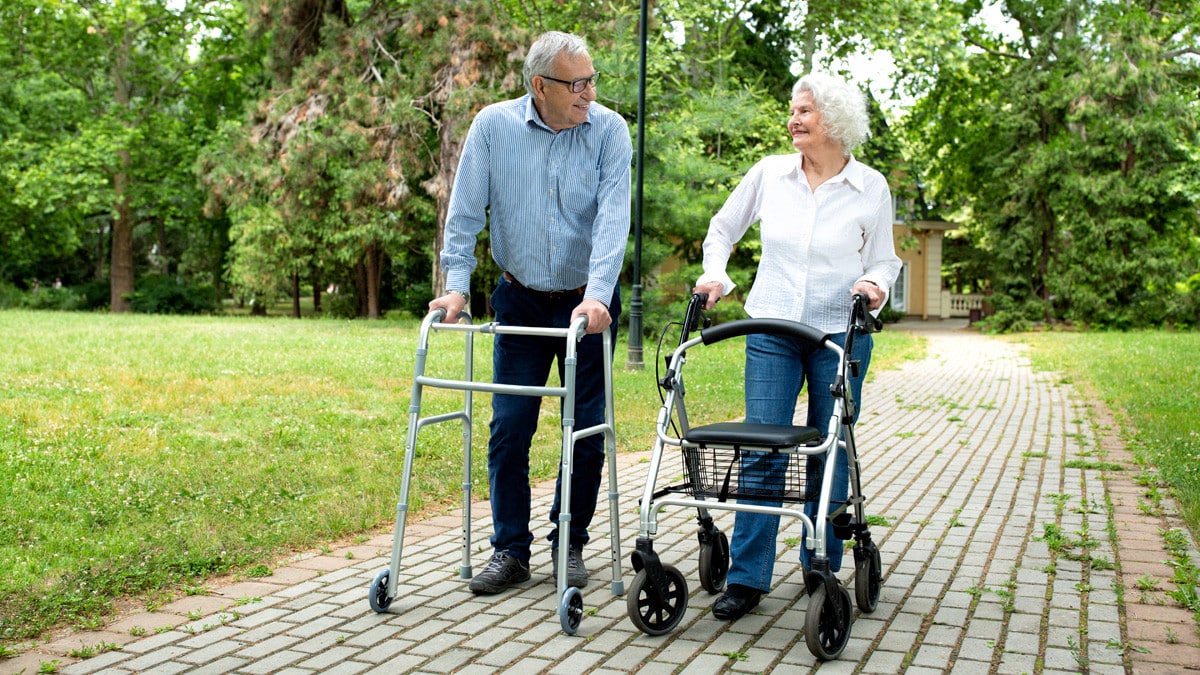Key Points
-
Your immune system changes as you age, which makes you more vulnerable to illnesses and infections.
-
Vitamins for seniors support a healthy immune system.
-
Help your immunity stay strong as you age with healthy lifestyle habits.
-
Choose vitamins for seniors that are easy for you to swallow and digest.
Your immune system naturally declines as you age, which makes it extra challenging to stay healthy. The good news is the right vitamins for seniors can help you stay healthy and disease-free.
Vitamins for seniors play a key role in keeping your immune system strong and ready to protect you from illness.
Why Is Immunity Important for Seniors?
Your immune system is a complex network of cells, tissues, and organs. It defends your body against things that cause infection, like bacteria, viruses, toxins, parasites, cancer cells, and blood or tissues from another person.
Your immune system changes throughout your life.
How Does Your Immune System Change As You Age
As you grow older, your immune system ages with you. Your body doesn’t produce as many virus and bacteria-fighting cells, and the antibodies you do make are less effective.
Plus, your immune system can't distinguish between your own and foreign cells as well as it once did, so it sometimes attacks your own body and causes autoimmune disorders as you age.
“Just as you probably can’t run as fast as you used to in your 20s, your immune system doesn’t work as well as it used to,” says Aaron E. Glatt, MD, chairman of the department of medicine at South Nassau Communities Hospitals.
These changes in immune function make older people vulnerable to infections and cancers.
Pneumonia, influenza, infective endocarditis, and tetanus are all more common among older people and result in death more often. Elderly patients do not respond to immunizations as robustly and they recover from injuries, infections, and illnesses more slowly.
How To Boost Your Immunity
Just as your immune system changes throughout your lifetime, it also changes in response to infections, vaccines, and lifestyle. Help your immunity stay strong as you age by taking good care of it.
Stay on Top of Your Health
Chronic health conditions like diabetes or arthritis affect how you feel and function. When these ailments are well-controlled they take less of a toll on your immune system.
Sleep Well
Too little sleep — or poor-quality sleep — lowers your immunity. People who don't get quality or enough sleep are more likely to get sick after exposure to a virus like the common cold, and it will affect how fast you recover if you do get sick.
Your body needs at least seven hours of sleep per night. If you snore or have trouble falling or staying asleep, see your doctor. You could have a sleep disorder.
Look for Ways To Reduce Stress
Stress takes a toll on the body in many ways and over time it may lessen your immune response. Stress causes your body to produce more of a hormone called cortisol, which suppresses your immune system's ability to fight off invaders. Stress can also trigger other issues, like poor sleep and a bad diet, which contribute to poor immune function.
Steer Clear of Sick People
When you’re older you need to be more careful about exposure to illnesses, since you may be more prone to getting sick or more likely to have a serious infection. If you must be around people who have contagious conditions like a cold or the flu, try not to get too close and wash your hands more often.
Don’t Skip Your Vaccines
Vaccines become less effective for you as you age because your immune system doesn’t mount as vigorous a response. Even so, they’re an important way to lower your risk of many serious illnesses like the flu and pneumonia.
Move Often
Regular exercise does more than help you stay fit — it makes your immune system stronger. Exercise mobilizes your immune cells to defend against pathogens. People who exercise regularly typically experience fewer illnesses and less systemic inflammation.
Eat Well
No one diet improves immunity. A varied diet full of vitamin- and mineral-rich foods (like fresh vegetables and fruit) helps your body — including your immune system — function at its best. Improving your nutrition also helps you maintain a healthy weight, which puts less stress on your body and improves your immunity.
Limit Alcohol
Drinking too much alcohol can weaken your defenses because your immune cells won't work as well and there might be fewer of them. Even a single drinking binge temporarily weakens your immune system.
Don’t Smoke
Smoking weakens your body’s immune response, making you more susceptible to illness and infection. Plus, smoking causes cancer, heart disease, stroke, lung disease, and chronic obstructive pulmonary disease.
Take Vitamins for Seniors
Vitamin supplements for seniors help you meet your nutritional needs. Vitamins support immunity, cognitive function, joint health, and overall well-being.
Which Vitamins Support the Immune System?
As you get older, you need enough of these important nutrients to support optimal immune function. Always speak with a doctor before you start something new.
Vitamin C
Vitamin C supports tissue growth and repair all over the body. It aids in wound healing and maintains healthy bones, teeth, skin, and cartilage. Vitamin C is an antioxidant that fights free radicals in the body, which may prevent or delay cancer and heart disease and promote healthy aging.
Vitamin D
Vitamin D is not just a nutrient — it’s a hormone with receptors in nearly every cell and tissue of the body. Vitamin D helps the body fight off infections and suppresses the immune response that causes inflammation. It may even reduce cancer cell growth.
Vitamin E
Vitamin E is one of the most effective nutrients known to modulate immune function. Supplementing with vitamin E in amounts above your dietary needs can improve your immune system function and reduce infection risk.
Zinc
Zinc is a trace mineral required by almost 100 different enzymes to carry out vital chemical reactions in the body. It is a major player in creating DNA, cell growth, building proteins, healing damaged tissue, and supporting a healthy immune system.
The elderly may have low zinc intake, which results in an increased risk of infections such as pneumonia and skin ulcers.
Choose the Right Form of Vitamins for You
Vitamin supplements come in a range of forms. The right one for you depends on your tastes, sensitives, and ability to swallow pills.
Tablets
Tablets are powdered ingredients compressed into a solid, smooth-coated pill that breaks down in the digestive tract. They are either swallowed whole or crushed into powder form. Some tablets have a protective coating to prevent them from breaking down in the stomach, which ensures that the tablet dissolves after entering the small intestine.
In addition to their active ingredients, most tablets contain additives for structural integrity as well as to improve the texture or appearance of the tablet.
Capsules
Capsules encase ingredients in a gelatin or plant-based shell that is easier for the elderly to swallow than tablets. Capsules can contain extended-release beads since they don’t require compression as tablets do, and capsules have fewer fillers than tablets. Your stomach can digest capsules more easily and the coating masks any unpleasant tastes or odors of the ingredients.
Powdered
Powdered vitamin supplements are a great option if you have trouble swallowing pills, or if you have difficulty absorbing vitamins in pill form. You can easily mix powders into food or drinks.
Liquid
Liquid vitamin supplements are another good choice if you have difficulty swallowing pills or if you want to adjust your dosage more precisely. Your body absorbs liquid vitamins more quickly and efficiently than it does other forms of supplements. Look for a high-quality liquid vitamin supplement that doesn't contain added sugars or artificial ingredients.
Gummies
Gummies are chewable, candy-like supplements that come in a variety of flavors and shapes. They are a tasty way to get your daily vitamin. However, some gummy vitamins are high in sugar and calories or contain sugar substitutes that may cause gastrointestinal issues for some people.
Vitamin Supplements for a Strong Immune System
You have a lot of choices to consider for vitamin supplements. To make your decision easier, look for a formula designed for your unique health conditions. Select a supplement that is free of junk fillers and contains the immune-boosting nutrition you need.
HUM Nutrition Here Comes The Sun™ Vitamin D Immune System Support Supplement is a soft gel capsule that contains vitamin D3 to support the immune system and boost mood. It's 100 percent vegan, packed with high-potency D3 in its most bioactive form, and its formula promotes a healthy immune system, boosted mood, and bone strength. You can get all the benefits of daily sunshine without UV damage.
HUM Nutrition Boost Sweet Boost™ Vegan Gummies for Immune Support is a gummy formulated with immunity-boosting ingredients like vitamin C, zinc, and elderberry to strengthen your natural defenses. This formula boosts immunity, supports innate and adaptive immune functions, and promotes overall health and well-being. Two gummies contain up to 75 times elderberry concentrate — the equivalent of 15 fresh berries.
Boost Immunity With the Right Supplements
Your immune system is on the front line to keep you healthy and active in your senior years. Take care of it with good lifestyle habits and the right vitamins to fuel your defenses against illness and infection.
These easy changes to your lifestyle and nutrition pay off with better health in your senior years.
For all things related to senior living, subscribe to Gold Years.









